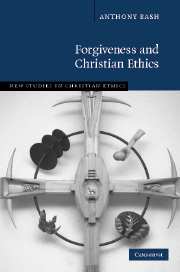Book contents
- Frontmatter
- Contents
- General editor's preface
- Preface
- Chapter 1 Forgiveness and wrongdoing
- Chapter 2 Forgiveness then and now
- Chapter 3 Forgiveness and psychological therapy
- Chapter 4 Justice and forgiveness
- Chapter 5 Forgiveness and the New Testament
- Chapter 6 The ideal of forgiveness
- Chapter 7 Forgiveness and structural wrongdoing
- Chapter 8 Forgiveness, punishment and justice
- Chapter 9 Varieties of forgiveness
- Chapter 10 Afterthoughts
- Bibliography
- Indexes
Chapter 10 - Afterthoughts
Published online by Cambridge University Press: 22 September 2009
- Frontmatter
- Contents
- General editor's preface
- Preface
- Chapter 1 Forgiveness and wrongdoing
- Chapter 2 Forgiveness then and now
- Chapter 3 Forgiveness and psychological therapy
- Chapter 4 Justice and forgiveness
- Chapter 5 Forgiveness and the New Testament
- Chapter 6 The ideal of forgiveness
- Chapter 7 Forgiveness and structural wrongdoing
- Chapter 8 Forgiveness, punishment and justice
- Chapter 9 Varieties of forgiveness
- Chapter 10 Afterthoughts
- Bibliography
- Indexes
Summary
The ancient world – whether Jewish or Gentile – gave little thought to the ethics of forgiveness. Plutarch and Seneca alone among pre-Christian writers discussed forgiveness and even Aristotle did not list forgiveness as a virtue. In the Hebrew Scriptures, though God was forgiving, forgiveness was not enjoined as a human virtue or duty.
The place and significance of forgiveness changed as a result of the influence of the Christian gospel. Christians understood forgiveness to be integral to the Christian gospel and an attribute of God that they ought to model in their relations with other people. One of the great ethical achievements of the New Testament and the Christian church was to establish forgiveness as a moral virtue. Throughout the two millennia of the Christian era and until very recently, thought, discussion and critical reflection about forgiveness principally took place in the context of Christian theology. Christians had the ‘market niche’ when it came to forgiveness.
A significant change occurred in the second half of the twentieth century. The Christian understanding of forgiveness was no longer always the starting point for discourse about forgiveness. Some who reflected on forgiveness – Anne C. Minas is an example in Minas 1975 – specifically distanced themselves from the Christian traditions about forgiveness. Christians lost the ‘market niche’ on the subject in this period.
- Type
- Chapter
- Information
- Forgiveness and Christian Ethics , pp. 174 - 186Publisher: Cambridge University PressPrint publication year: 2007



